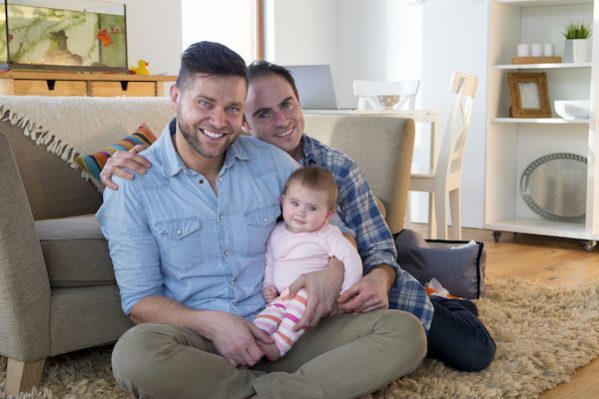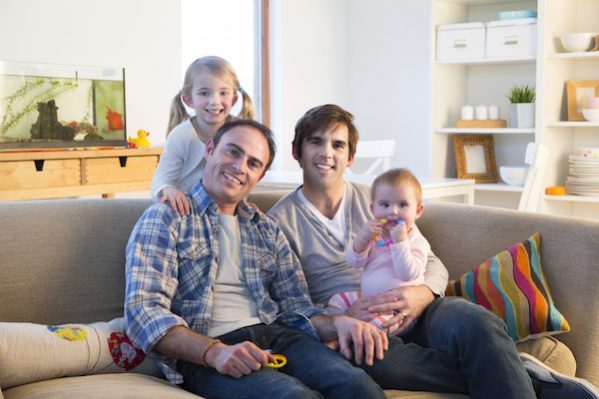Surrogacy for LGBT+ couples – What you need to know

For those in the LGBT+ community, creating a family is not straightforward. Biology and the law have to both be considered long before a baby is conceived.
Surrogacy is now very much de rigueur, and, in the last five years, the UK has seen an exponential increase in the number of Parental Order applications following surrogate births. My firm is only too aware of this, as we have a vast number of clients from the LGBT+ community choosing to start their families through surrogacy.
The law governing surrogacy dates in part from the 1980s when attitudes towards surrogacy itself, and the LGBT+ community, were vastly different from what they are today. The law reforms announced by the Law Commission and The Scottish Law Commission on 6 June 2019 are therefore very much welcomed by all involved, but particularly by LGBT+ families.
What are the laws now?

As it stands now, when a child is born through a surrogacy arrangement, whether they are born here in the UK, or abroad, if the intended parents wish to live with the child in the UK, then an application must be made in the UK courts for a Parental Order. The Parental Order will then extinguish the legal status of the birth mother (and her spouse if she has one) and confer legal parentage on the intended parents. Without that order, the birth mother will remain legally responsible for that child. The intended parents, who in reality are the only parents the child knows, have no legal standing to make crucial decisions, such as consent to medical procedures for their child, as they have no Parental Responsibility.
It will also change the UK birth certificate to ensure that the intended parents’ details are instead recorded.
In order to be eligible to apply for a Parental Order, at least one of the intended parents must be domiciled in the UK, at least one of the intended parents must have a biological connection to the child, the child must live with the intended parents, they must be over 18, have made the application within 6 months of the child’s birth, have the surrogate’s (and her spouse’s) consent and only reasonable expenses must have been paid to the surrogate. Since January 2019 it is now possible for single people to apply for a Parental Order, but the above criterion must still apply and those separated can utilise recent ground-breaking caselaw, achieved by this firm, that if intended parents are separated an order can still be achieved as ‘living’ together can apply to two homes.
The glaring fault with the Parental Order process is the requirement to have to apply for it in the first place. From the moment of birth, up until that Order is granted, the child, and the intended parents live in limbo. Speak to any surrogate and they will tell you that they want to carry the child to enable other people (often LGBT+ people), who can’t have a child in the usual way, to have a family. They do not want to be legally responsible for that child, yet the law keeps them entwined despite (usually) no biological connection and no intention to be so responsible. The surrogate bears the child for the intended parents on trust that they will make that application for a Parental Order which will then extinguish her legal responsibilities.
As for the intended parents, until that Order is made, they are, in the eyes of the law, not legally related to their child. Yet in reality they wanted the child, they love the child and they care for the child. Why should that child, and the intended parents, be in that limbo position? It leaves many risks, that Wills and insurances can mitigate, but the uncertainty of 100% protection during this period is difficult for all the parties.
Proposed new laws

The Law Commission and The Scottish Law Commission have recognised this failure and have committed to reforming the law. The consultation into surrogacy law is currently open until September 2019 and their proposals include a new pathway to parenthood which would recognise the intended parents as the legal parents from birth. With the new pathway, the ‘work’ would be done pre-conception. This would include finding the surrogate, medical checks, enhanced criminal records checks, independent legal advice and implications counselling for all parties, then a written surrogacy agreement and an assessment of the welfare of the child. Once the child is born, the intended parents will be the legal parents (without the need to make a court application) subject to the birth mother objecting within a defined period. If the surrogate does object, then the intended parents would need to make an application for a Parental Order in the usual way.
However, this new pathway would not be applicable to international surrogacy arrangements. Instead, the proposal is that recognition would be on a “country by country” basis and that there should be a streamlining and shortening of the process of obtaining a passport or a visa for the child born overseas so that that process begins before birth.
These proposed reforms to the current surrogacy legislation have been welcomed by the LGBT+ community as well as by the community of surrogates. The proposed reforms will enable the law to reflect the reality of these new families and ensure that the child is legally protected and cared for by their intended parents from the moment of birth.
Karen Holden, Founder at A City Law Firm
Opinions expressed in this article may not reflect those of THEGAYUK, its management or editorial teams. If you'd like to comment or write a comment, opinion or blog piece, please click here.


